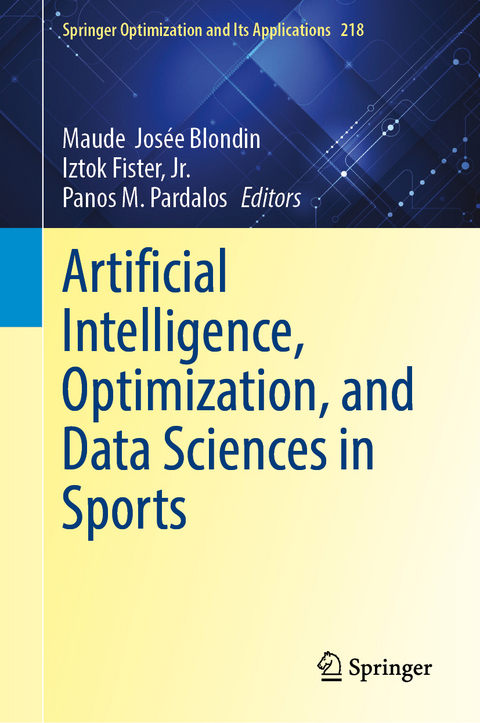
Artificial Intelligence, Optimization, and Data Sciences in Sports
Springer International Publishing (Verlag)
978-3-031-76046-4 (ISBN)
This book delves into the dynamic intersection of data science, data mining, machine learning, and optimization within sports. It compiles and presents the latest achievements in this vibrant and emerging research area, offering a comprehensive overview of how these technologies revolutionize sports analytics and performance.
Topical coverage includes artificial intelligence in sports, automated machine learning for training sessions, computational social science, and deep learning applications. Readers will also explore cutting-edge concepts such as digital twins in sports and sports prediction through data analysis. This volume highlights theoretical advancements and practical case studies that demonstrate real-world applications.
Ideal for researchers, practitioners, and students in fields related to sports science, data analytics, and machine learning, this book serves as a crucial resource for anyone looking to understand the transformative impact of technology on sports. Whether you are an academic scholar or a professional working in the industry, this collection offers valuable insights that bridge the gap between research and practical solutions.
Maude J. Blondin, Eng, has been an assistant professor at the Electrical and
Computer Engineering (ECE) Department at UdeS since Sept. 2020. She is the head
of Multiobjective Optimization REsearch lab (MORE Lab) at UdeS, a laboratory
that she founded and counts currently 9 students and postdocs. She has strong
optimization and control training applied to practical systems with advanced skills
in distributed and multiobjective optimization and control algorithms applied to
MAS (Ph.D. in Electrical Engineering and Postdoctoral research in Mechanical and
Aerospace engineering, University of Florida, Gainesville, Florida, USA). She
published a book on the recent progress of optimization in control in 2021 and
coedited two contributed books. She is on the editorial board of the SN Operations
Research Forum journal. She has published more than 20 peer-reviewed articles in
renowned conferences and journals and reviewed more than 55 publications for
recognized conferences and high-impact factors journals. She has been invited as a
guest speaker on eight national and international occasions. Since the start of her
career, i.e., Sept. 2020, she has gathered more than 620k$ as PI/co-PI and more than
500k$ as a co-investigator.
Iztok Fister Jr. received the B.Sc. and M.Sc. degrees in computer science from the
University of Maribor in 2011 and 2013, respectively, where he is currently
pursuing a Ph.D. degree. He has participated in the development of more than 100
scientific papers. His interests include evolutionary computation, sports data
mining, and mobile and pervasive computing. Furthermore, he is a member of the
Editorial Board of several international journals. He has acted as a program
committee in more than 25 international conferences.
Panos M. Pardalos serves as professor emeritus of industrial and systems
engineering at the University of Florida. Additionally, he is the Paul and Heidi
Brown Preeminent Professor of industrial and systems engineering. He is also an
affiliated faculty member of the computer and information science Department, the
Hellenic Studies Center, and the biomedical engineering program. He is also the
director of the Center for Applied Optimization. Pardalos is a world-leading expert
in global and combinatorial optimization. His recent research interests include
network design problems, optimization in telecommunications, e-commerce, data
mining, biomedical applications, and massive computing.
Chapter 1. Artificial Intelligence, Optimization, and Data Sciences in Sports: Editorial.- Chapter 2. Machine Learning for Soccer Match Result Prediction.- Chapter 3. Machine learning for prediction of the index of effec-tiveness in cycling.- Chapter 4. Machine Learning in Biomechanics: Key Applications and Limitations in Walking, Running, and Sports Movements.- Chapter 5. Artificial Intelligence & Machine Learning-Based Data Analytics for Sports. General Overview & NBA Case Study.- Chapter 6. An ecological dynamics approach to the use of Artificial Intelligence and Machine Learning to analyse performance in football.- Chapter 7. A Supervised Learning Approach for Evaluating Football Performances.- Chapter 8. Bridging Route based Cycling Training with Digital Twins.- Chapter 9. Perspectives of Artificial Intelligence in Training and Exercise.- Chapter 10. A fuzzy model for optimise the football rule assuring spectacle, fair play, objectivity and ethics.- Chapter 11. Physical Efficiency in Soccer: Relevance, Correlations and Impacts using AI Methods.- Chapter 12. A PageRank-Based Method for College Football Recruiting Rankings.- Chapter 13. APPLICATIONS OF IMPROVEMENTS TO THE PYTHAGOREAN WON-LOST EXPECTATION IN OPTIMIZING ROSTERS.
| Erscheinungsdatum | 01.02.2025 |
|---|---|
| Reihe/Serie | Springer Optimization and Its Applications |
| Zusatzinfo | XI, 353 p. 60 illus., 50 illus. in color. |
| Verlagsort | Cham |
| Sprache | englisch |
| Maße | 155 x 235 mm |
| Themenwelt | Mathematik / Informatik ► Informatik ► Datenbanken |
| Informatik ► Theorie / Studium ► Künstliche Intelligenz / Robotik | |
| Mathematik / Informatik ► Mathematik ► Angewandte Mathematik | |
| Schlagworte | computational intelligence sports • digital twins sports • machine learning sport • Sports analytics • theory sports training |
| ISBN-10 | 3-031-76046-8 / 3031760468 |
| ISBN-13 | 978-3-031-76046-4 / 9783031760464 |
| Zustand | Neuware |
| Informationen gemäß Produktsicherheitsverordnung (GPSR) | |
| Haben Sie eine Frage zum Produkt? |
aus dem Bereich


